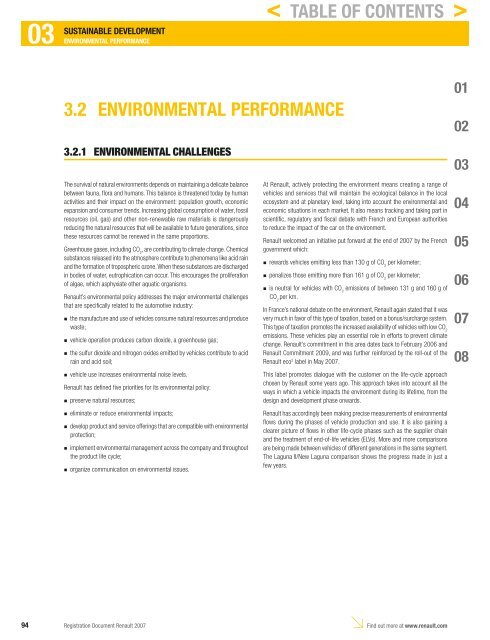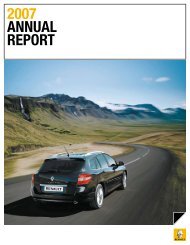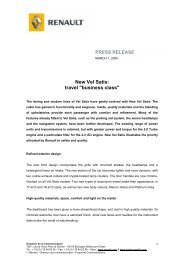2007 Interactive Registration Document - Renault
2007 Interactive Registration Document - Renault
2007 Interactive Registration Document - Renault
Create successful ePaper yourself
Turn your PDF publications into a flip-book with our unique Google optimized e-Paper software.
03 ENVIRONMENTAL<br />
SUSTAINABLE DEVELOPMENT<br />
PERFORMANCE<br />
3.2 ENVIRONMENTAL PERFORMANCE<br />
3.2.1 ENVIRONMENTAL CHALLENGES<br />
The survival of natural environments depends on maintaining a delicate balance<br />
between fauna, fl ora and humans. This balance is threatened today by human<br />
activities and their impact on the environment: population growth, economic<br />
expansion and consumer trends. Increasing global consumption of water, fossil<br />
resources (oil, gas) and other non-renewable raw materials is dangerously<br />
reducing the natural resources that will be available to future generations, since<br />
these resources cannot be renewed in the same proportions.<br />
Greenhouse gases, including CO 2 , are contributing to climate change. Chemical<br />
substances released into the atmosphere contribute to phenomena like acid rain<br />
and the formation of tropospheric ozone. When these substances are discharged<br />
in bodies of water, eutrophication can occur. This encourages the proliferation<br />
of algae, which asphyxiate other aquatic organisms.<br />
<strong>Renault</strong>’s environmental policy addresses the major environmental challenges<br />
that are specifi cally related to the automotive industry:<br />
n<br />
n<br />
n<br />
n<br />
the manufacture and use of vehicles consume natural resources and produce<br />
waste;<br />
vehicle operation produces carbon dioxide, a greenhouse gas;<br />
the sulfur dioxide and nitrogen oxides emitted by vehicles contribute to acid<br />
rain and acid soil;<br />
vehicle use increases environmental noise levels.<br />
<strong>Renault</strong> has defi ned fi ve priorities for its environmental policy:<br />
n<br />
n<br />
n<br />
n<br />
n<br />
preserve natural resources;<br />
eliminate or reduce environmental impacts;<br />
develop product and service offerings that are compatible with environmental<br />
protection;<br />
implement environmental management across the company and throughout<br />
the product life cycle;<br />
organize communication on environmental issues.<br />
At <strong>Renault</strong>, actively protecting the environment means creating a range of<br />
vehicles and services that will maintain the ecological balance in the local<br />
ecosystem and at planetary level, taking into account the environmental and<br />
economic situations in each market. It also means tracking and taking part in<br />
scientifi c, regulatory and fi scal debate with French and European authorities<br />
to reduce the impact of the car on the environment.<br />
<strong>Renault</strong> welcomed an initiative put forward at the end of <strong>2007</strong> by the French<br />
government which:<br />
rewards vehicles emitting less than 130 g of CO 2 per kilometer;<br />
penalizes those emitting more than 161 g of CO 2 per kilometer;<br />
is neutral for vehicles with CO 2 emissions of between 131 g and 160 g of<br />
CO 2 per km.<br />
I n France’s national debate on the environment, <strong>Renault</strong> again stated that it was<br />
very much in favor of this type of taxation, based on a bonus/surcharge system.<br />
This type of taxation promotes the increased availability of vehicles with low CO 2<br />
emissions. These vehicles play an essential role in efforts to prevent climate<br />
change. <strong>Renault</strong>’s commitment in this area dates back to February 2006 and<br />
<strong>Renault</strong> Commitment 2009, and was further reinforced by the roll-out of the<br />
<strong>Renault</strong> eco 2 label in May <strong>2007</strong>.<br />
This label promotes dialogue with the customer on the life-cycle approach<br />
chosen by <strong>Renault</strong> some years ago. This approach takes into account all the<br />
ways in which a vehicle impacts the environment during its lifetime, from the<br />
design and development phase onwards.<br />
<strong>Renault</strong> has accordingly been making precise measurements of environmental<br />
fl ows during the phases of vehicle production and use. It is also gaining a<br />
clearer picture of fl ows in other life-cycle phases such as the supplier chain<br />
and the treatment of end-of-life vehicles (ELVs). More and more comparisons<br />
are being made between vehicles of different generations in the same segment.<br />
The Laguna II/New Laguna comparison shows the progress made in just a<br />
few years.<br />
94 <strong>Registration</strong> <strong>Document</strong> <strong>Renault</strong> <strong>2007</strong><br />
Find out more at www.renault.com<br />
n<br />
n<br />
n<br />
< TABLE OF CONTENTS ><br />
01<br />
02<br />
03<br />
04<br />
05<br />
06<br />
07<br />
08




